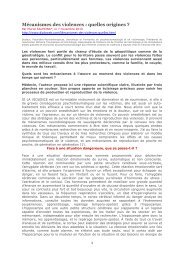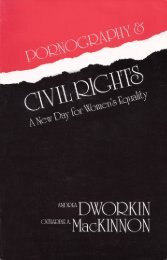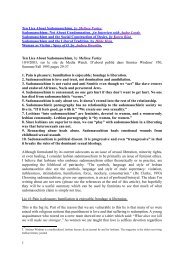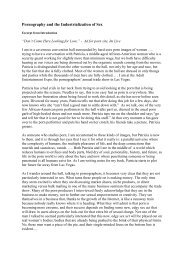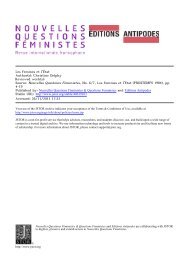The Industrial Vagina: The Political Economy of the Global Sex Trade
The Industrial Vagina: The Political Economy of the Global Sex Trade
The Industrial Vagina: The Political Economy of the Global Sex Trade
- No tags were found...
Create successful ePaper yourself
Turn your PDF publications into a flip-book with our unique Google optimized e-Paper software.
138 Prostitution tourismhow ‘sex’ tourism operates as a service sector for <strong>the</strong> capitalistwest, refreshing tired corporate warriors in a form <strong>of</strong> ‘rest andrecreation’ similar to that created for US soldiers in South East Asia(Jyoti Sanghera, 1997). Kemala Kempadoo explains that prostitutiontourism props up ‘corporate capital, First World identities, andmasculine hegemony’ (Kempadoo, 1999b, p. 18).Prostitution tourism <strong>of</strong>fers men from rich countries <strong>the</strong> opportunityto confirm <strong>the</strong>ir masculine dominance over women, whoare claiming equality in <strong>the</strong> west and prepared nei<strong>the</strong>r to acceptmasculine authority nor to adapt <strong>the</strong>mselves so dutifully to men’ssexual demands. As Kempadoo puts it: ‘Many male sex tourists ...expressed <strong>the</strong> view that in <strong>the</strong>ir home countries, women enjoyexcessive power, through which traditional male authority is beingundermined ... In <strong>the</strong> Caribbean, <strong>the</strong>y are able to fully reaffirm<strong>the</strong>ir masculinity’ (ibid., p. 26). However, Kempadoo takes a sexwork approach and positions <strong>the</strong> prostituted women and men <strong>of</strong> <strong>the</strong>Caribbean as having ‘agency’ and being involved in acts <strong>of</strong> transgressionwhich free <strong>the</strong>m from oppressive relations ra<strong>the</strong>r than subjecting<strong>the</strong>m to oppression. Too many studies, she considers, emphasize<strong>the</strong> problems associated with prostitution, and obscure <strong>the</strong> ‘agencyand subjectivity’ <strong>of</strong> sex workers (Kempadoo, 2001, p. 41).Though this feminist work shows an acute awareness that prostitutiontourism is based on class, race and gender inequality, it takes<strong>the</strong> position that recognizing prostitution as work and legalizingit will resolve <strong>the</strong> problems associated with <strong>the</strong> practice. BeverleyMullings, for instance, writing about Jamaica, says that if ‘paidsexual labor’ is not recognized as ‘legitimate work’ <strong>the</strong>n <strong>the</strong> sexworkers will be vulnerable to labour and human rights abuses(Mullings, 1999). <strong>Sex</strong> tourism should, she says, ‘be viewed as anexport industry, with consumers who import services from localproviders’ (ibid., p. 57). Taking this ‘industry approach’ will allow<strong>the</strong> ‘truly exploitative aspects’ to be ‘more effectively policed’ (ibid.,p. 79). ‘<strong>Sex</strong>’ tourism can <strong>the</strong>n take on <strong>the</strong> character <strong>of</strong> a ‘trulycommunity-based tourism’ (ibid., p. 79). In fact studies <strong>of</strong> <strong>the</strong> statesin which prostitution has been recognized as work and <strong>the</strong> industryhas been legalized do not support <strong>the</strong> notion that this approach willreduce <strong>the</strong> harms <strong>of</strong> prostitution (Farley, 2007; M. Sullivan, 2007;Shared Hope International, 2007). <strong>The</strong> field research and interviews<strong>of</strong> feminist prostitution tourism researchers, whe<strong>the</strong>r <strong>the</strong>y take a sexwork perspective or not, provide good support for <strong>the</strong> notion thatprostitution tourists from <strong>the</strong> rich western world seek to compensate



